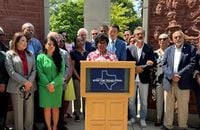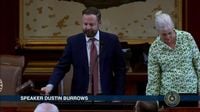The Texas State Capitol was a flurry of anticipation and frustration on August 15, 2025, as lawmakers returned for a second special legislative session. But when roll call echoed through the chamber, it was clear: the Texas House still lacked the quorum needed to conduct business. Democratic lawmakers, steadfast in their absence, continued their strategy of blocking a Republican-led redistricting plan, leaving both legislative priorities and disaster relief efforts in limbo.
House Speaker Dustin Burrows, a Republican from Lubbock, addressed the chamber with a mixture of resolve and hope. “Showing up is half the battle, and those present today will have a say in what we accomplish over the next 30 days, or hopefully fewer,” he told the members, expressing his expectation that the House would reach quorum by Monday, August 18. “So let’s be ready to work,” Burrows urged, signaling that the legislative clock was ticking for both parties.
The failure to reach quorum wasn’t a new development. The first special session had ended earlier that same day after six consecutive unsuccessful attempts, each time falling just five members short. Democratic lawmakers, many of whom had left the state, remained resolute in their protest against the Republican redistricting proposal—a plan designed to redraw Texas’s 38 congressional districts and potentially give Republicans an advantage of five additional House seats. Only minor tweaks had been made to the West Texas portion of the map, but the core of the proposal remained unchanged.
Governor Greg Abbott wasted no time. Within minutes of closing the first special session, he launched a second one, expanding the agenda to include youth camp safety measures alongside the original 18 items. “Do not go very far,” Speaker Burrows warned, emphasizing the urgency and the likelihood of a rapid return to business.
The ongoing standoff in Austin was more than just a local political spectacle—it was part of a growing national battle over redistricting. As reported by Nexstar, California Governor Gavin Newsom announced that his state would release its own redistricting proposal on August 18, vowing not to be passive amid what he described as a nationwide escalation of gerrymandering. “We’re not waiting and we’re not anticipating that the states will be passive, particularly with the directive coming from President Donald Trump,” Newsom stated. Abbott, for his part, dismissed the California governor’s remarks, calling him “all talk and no action,” and hinted that Texas might expand its redistricting efforts to include state House districts as well. “We hold a lot more bullets in our belt that we’ll be ready to use when [we] need to,” Abbott warned during a Friday press conference.
For Democratic lawmakers, the strategy of breaking quorum was both a political statement and a test of endurance. “We have members who are like, let’s keep going into infinity. They want to fight,” said House Democratic Caucus Chair Gene Wu. “But at the same time, we have, I mean, look, we came out of a bruising regular session, and people are tired. People are exhausted. Staff has been running, just doing like 16-18 hour days for two, three months now.” Wu acknowledged the toll the standoff was taking but insisted, “All of us were able to stay together and see the end of this first session come to an end. We did exactly what we said we needed to do, and that is bringing a spotlight on this issue.”
Other Democrats echoed the sense of mission. “The people of the state of Texas are rising up. The people of America are rising up because everybody has had enough,” Wu asserted. Still, exhaustion was evident, with only one Democrat, Rep. Ann Johnson of Houston, confirmed to be planning a return to Texas as of Friday evening. Wu remained optimistic, predicting that the quorum break would ultimately set Democrats up for a rare victory: “I think Democrats are going to get a win, our first win in a long time.”
Meanwhile, House Republicans projected confidence that the chamber would soon have the numbers to proceed. Speaker Burrows predicted that, once business resumed, lawmakers would “move immediately to pass a strong pro life bill, to protect women’s spaces, and more property tax protections without the threat of procedural gamesmanship getting in the way.” The second special session, which can last up to 30 days, required all bills to be refiled and the legislative process to start anew—a daunting prospect for both sides.
The legislative impasse wasn’t without real-world consequences. One of the most pressing unfinished items was relief for victims of the devastating Hill Country floods that killed more than 100 people over the July 4 weekend. State Rep. Wes Virdell, a Republican from Brady who represents many of the flood-affected areas, voiced his frustration: “It’s incredibly disappointing. We have people that need resources right now. We have some funding in some of those bills that I think would be critical.”
For residents like Nathan and Audrey Rich of Kerr County, the political drama in Austin has translated into ongoing hardship. After their home and business were ravaged by floodwaters, the couple secured some aid from FEMA and local grants but still face a daunting financial gap. “We don’t have the money to just rebuild, go buy a house, go rent somewhere,” Audrey told KXAN, her voice breaking. The couple has moved into a camper on a friend’s property, taking life “one day at a time.” Community groups like the Center Point Alliance for Progress have stepped in, distributing private donations and grants, but even their efforts can only go so far. “It would be nice for our government to want to help but we’re going to try to make sure they’re taken care of regardless,” said Susan Walker, the alliance’s treasurer.
As both parties pointed fingers—Republicans accusing Democrats of abandoning their duties, Democrats charging that Abbott was leveraging disaster relief for political gain—the people of Hill Country and beyond waited. State Rep. Armando Walle, a Democrat from Houston, argued in the Houston Chronicle that Governor Abbott had the power to transfer emergency funds without legislative approval, a process known as budget execution. Shannon Halbrook, a fiscal policy analyst at Every Texan, confirmed that such transfers are possible but clarified that the governor cannot exercise this power while the legislature is in session.
For many Texans, the legislative wrangling in Austin has become background noise to more immediate concerns. “I got way more going on than to sit and watch the news and be mad at Democrats or be mad at Republicans, or whatever,” Nathan Rich said. With his business running again, he and Audrey remain focused on rebuilding their lives, hoping that the state’s leaders will soon find a way to break the deadlock and deliver much-needed relief.
As the second special session moves forward, the stakes remain high—not just for Texas politics, but for the thousands of Texans whose futures are caught in the crossfire of partisan conflict.



